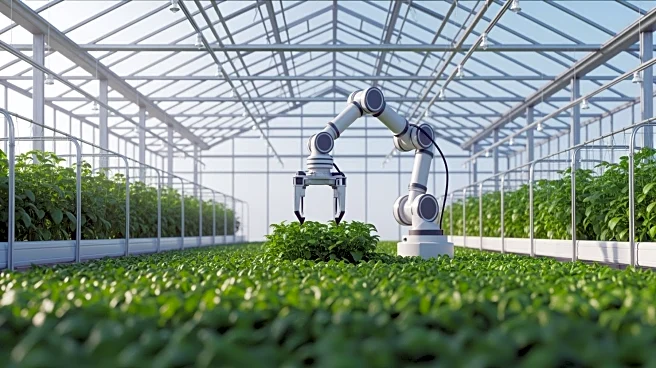What's Happening?
The Artificial Intelligence (AI) in Agriculture market is experiencing rapid growth, driven by the adoption of smart farming solutions and precision agriculture technologies. According to a report by Global
Data Route Analytics, the market was valued at approximately USD 1.94 billion in 2020 and is projected to expand at a compound annual growth rate (CAGR) of 26.2% through 2035. Key drivers of this growth include rising demand for digital farming, AI-powered crop monitoring, and automation in agriculture. Major players in the market include IBM Corporation, Microsoft Corporation, and John Deere & Company, among others. The report highlights the importance of AI in enhancing productivity and sustainability in agriculture, with applications ranging from precision farming and crop monitoring to soil and nutrient management.
Why It's Important?
The growth of AI in agriculture is significant as it represents a shift towards more efficient and sustainable farming practices. By leveraging AI technologies, farmers can optimize input usage, enhance productivity, and reduce costs, which is crucial in addressing global food security challenges. The integration of AI in agriculture also supports the development of smart farming solutions, which can lead to improved crop yields and better resource management. This technological advancement is likely to benefit both smallholders and large agribusinesses, driving economic growth in the agricultural sector and potentially transforming traditional farming methods.
What's Next?
As the AI in agriculture market continues to expand, stakeholders can expect further innovations in smart farming technologies. Companies may increase investments in research and development to enhance AI algorithms and improve the accuracy of predictive analytics. Additionally, collaborations between hardware manufacturers and AI solution providers are likely to strengthen, ensuring seamless data collection and operational efficiency. Farmers and agribusinesses may increasingly adopt AI-driven insights to optimize farming practices, potentially leading to a more sustainable and productive agricultural industry.
Beyond the Headlines
The rise of AI in agriculture could have broader implications for environmental sustainability and food security. By improving resource efficiency and reducing waste, AI technologies can contribute to more sustainable farming practices, which are essential in combating climate change. Furthermore, the adoption of AI in agriculture may lead to shifts in labor dynamics, as automation reduces the need for manual labor, potentially impacting rural employment. Ethical considerations regarding data privacy and the equitable distribution of AI benefits may also arise as the technology becomes more prevalent.









